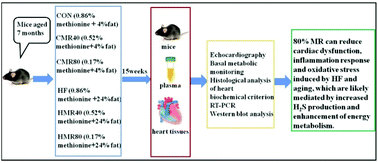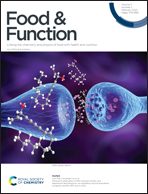Dietary methionine restriction improves the impairment of cardiac function in middle-aged obese mice†
Abstract
Dietary methionine restriction (MR) has been reported to extend lifespan, reduce obesity and decrease oxidative damage to mtDNA in the heart of rats, and increase endogenous hydrogen sulfide (H2S) production in the liver and blood. H2S has many potential benefits in the pathophysiology of the cardiovascular system. MR also increases the level of homocysteine (Hcy) in the liver and plasma, but elevated plasma Hcy is a risk factor for cardiovascular disease. Therefore, this study aimed to determine the effect of MR on cardiac function and metabolic status in obese middle-aged mice and its possible mechanisms. C57BL/6J mice (aged approximately 28 weeks) were divided into six dietary groups: CON (0.86% methionine + 4% fat), CMR40 (0.52% methionine + 4% fat), CMR80 (0.17% methionine + 4% fat), HFD (0.86% methionine + 24% fat), HMR40 (0.52% methionine + 24% fat) and HMR80 (0.17% methionine + 24% fat) for 15 consecutive weeks. Our results showed that 80% MR improves systolic dysfunction in middle-aged obese mice and enhances myocardial energy metabolism. 80% MR also reduces myocardial oxidative stress and improves inflammatory response. In addition, 80% MR increased mice Hcy levels and activated remethylation and transsulfur pathways of Hcy and promoted endogenous H2S production in the heart. 40% MR has the same trend, but is not significant. Moreover 40% MR at variance with 80% MR, did not decrease the body weight in both control and high-fat diet mice. These findings suggest that MR can improve myocardial energy metabolism, reduce heart inflammation and oxidative stress by increasing cardiac H2S production, and improve cardiac dysfunction in middle-aged obese mice.



 Please wait while we load your content...
Please wait while we load your content...